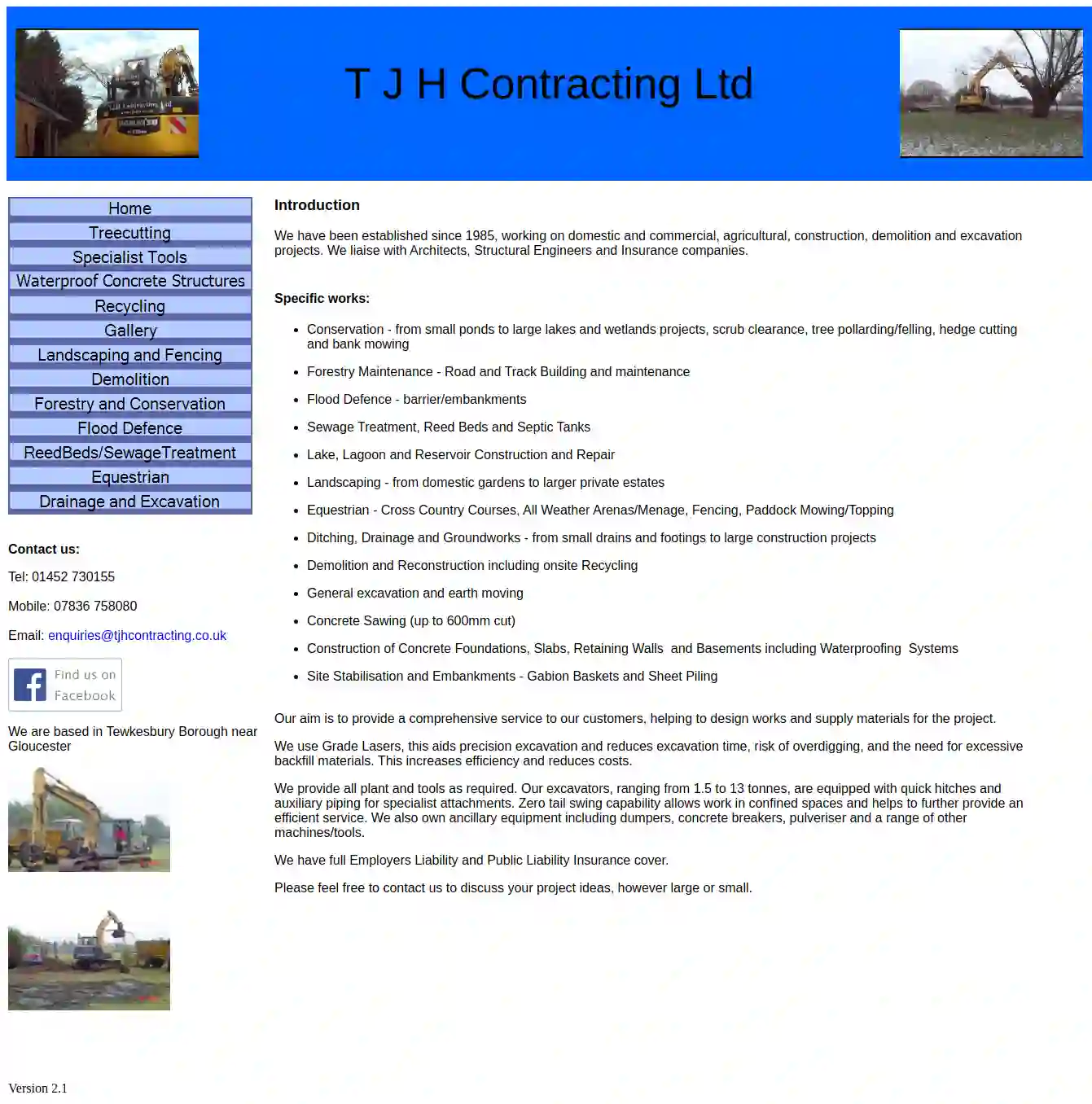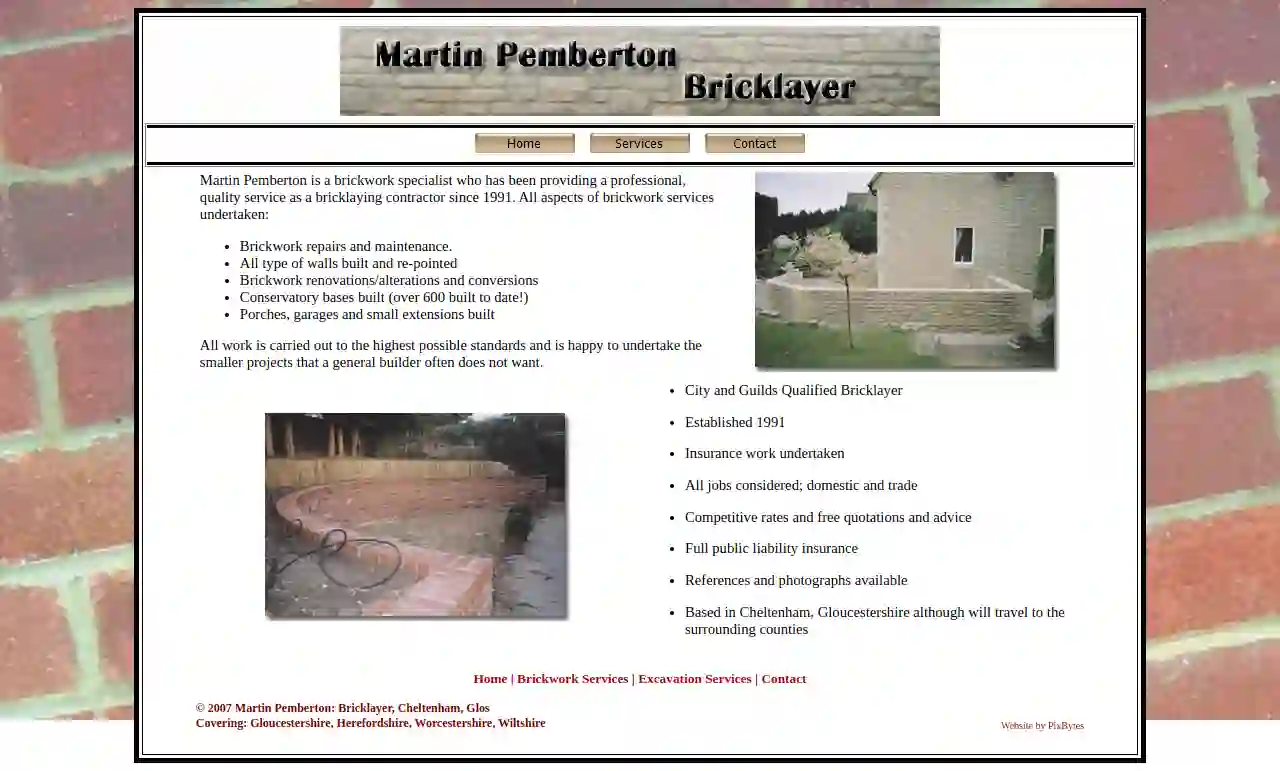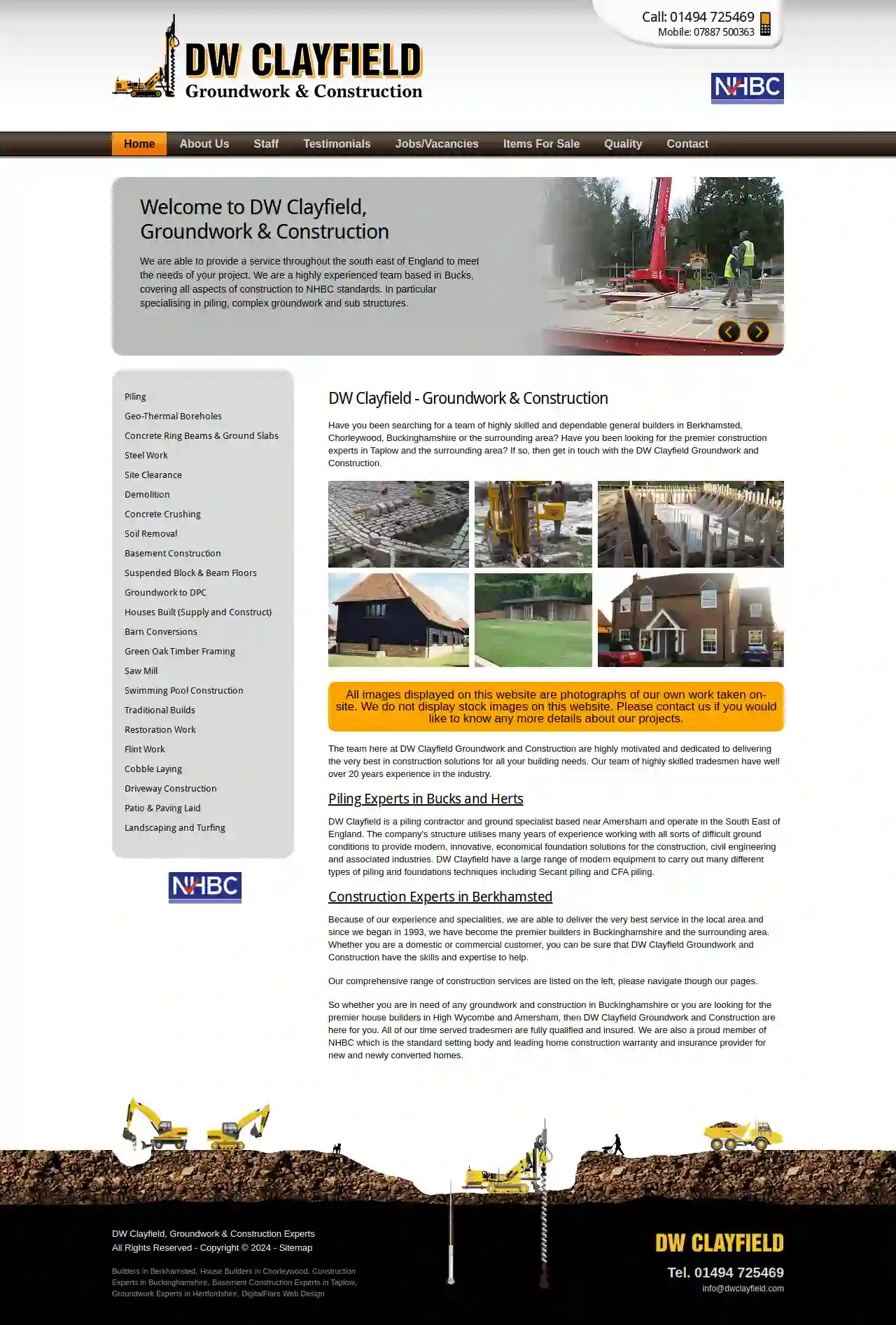Demolition Contractors Painswick
Top 10 Demolition Companies in Painswick
Get 3 FREE Demolition Services quotes for your project today! Compare profiles, reviews, accreditations, portfolio, etc... and choose the best service.

T J H Contracting Ltd
51 reviewsTewkesbury, GBAbout T J H Contracting Ltd T J H Contracting Ltd has been established since 1985, providing a comprehensive range of services for domestic, commercial, agricultural, construction, demolition, and excavation projects. We are based in Tewkesbury Borough near Gloucester and have a proven track record of working with Architects, Structural Engineers, and Insurance companies. Our commitment to quality and efficiency is evident in our use of Grade Lasers, which aid precision excavation, reduce excavation time, and minimize the need for excessive backfill materials. This approach increases efficiency and reduces costs for our clients. We are fully equipped with a range of plant and tools, including excavators ranging from 1.5 to 13 tonnes, equipped with quick hitches and auxiliary piping for specialist attachments. Our excavators' zero tail swing capability allows us to work in confined spaces, further enhancing our efficiency. We also own ancillary equipment such as dumpers, concrete breakers, pulverisers, and a variety of other machines and tools. We are fully insured with Employers Liability and Public Liability Insurance cover, providing peace of mind to our clients. We are passionate about providing a comprehensive service to our customers, helping to design works and supply materials for the project. We are dedicated to delivering high-quality results and exceeding our clients' expectations. Please feel free to contact us to discuss your project ideas, however large or small.
- Services
- Why Us?
- Gallery
Get Quote
Awkward Excavations
3.73 reviews15 Hereford Court, Milsom Street, Cheltenham, Gloucestershire, GL50 4BD, GBAwkward Excavations: Your One-Stop Shop for Groundworks and Construction Awkward Excavations is a trusted and experienced provider of groundworks and construction services in Cheltenham and the surrounding areas. We offer a comprehensive range of services, from foundations to landscaping, all delivered with the highest level of professionalism and expertise. Our Services Foundations up to DPC level (damp proof course) Drainage Concreting Demolition Driveways Ground levelling Ponds and pools Bricklaying Building and hard landscaping Tree stump removal General site/garden clearance Why Choose Awkward Excavations? Experienced and qualified team Competitive rates and free quotations No VAT payable Full public liability insurance Domestic and trade work undertaken All jobs considered, including insurance work References available Our Equipment We have a range of diggers available to suit any project, from a micro/mini-digger at half a ton to a five-ton digger and bulldozer. We also have a motorised mini-dumper truck for spoil removal. Our Commitment We are committed to providing our clients with the highest quality service and workmanship. We are also dedicated to leaving your site clean and tidy.
- Services
- Why Us?
- Our Team
- Gallery
Get Quote
Martin Pemberton
15 Hereford Court, Milsom Street, Cheltenham, Glos, GL50 4BD, GBMartin Pemberton Bricklaying Martin Pemberton is a brickwork specialist who has been providing a professional, quality service as a bricklaying contractor since 1991. He is a City and Guilds Qualified Bricklayer and is happy to undertake the smaller projects that a general builder often does not want. Martin is based in Cheltenham, Gloucestershire, although he will travel to the surrounding counties. Martin offers a full range of bricklaying services, from concrete blockwork, decorative brickwork, to stonework - both reconstituted and natural stone. Victorian brickwork is a speciality! He also offers a full groundworks preparation service, such as digging foundations and excavation work, using his own fully insured mini-digger. Martin is fully insured and offers competitive rates and free quotations and advice. He is happy to provide references and photographs of his work upon request.
- Services
- Why Us?
- Gallery
Get Quote
Cheltenham Demolition & Crusher Hire
Brookthorpe, Gloucester, Stroud Road, GL4 0UQ, GBWelcome to our website. We are an experienced demolition company with offices in Gloucester, Swindon, Worcester and now Bristol, delivering deconstruction and demolition services across the Midlands and Southwest of England, including Gloucestershire, Worcestershire, Herefordshire, Bath & Avon. With a commitment to providing a superior standard of workmanship on every project, our demolition contractors undertake a broad range of work, including licensed asbestos removal, asbestos disposal & reclamation services. When you need a demolition or deconstruction company, there is no better choice than Gloucester Demolition and asbestos specialist. ABOUT 2009 Year Established 1988 Projects Completed 780 Contractors Appointed
- Services
- Why Us?
- Gallery
Get Quote
GeMech Foundations Ltd
45 reviewsUnit 12 Kenn Court, South Bristol Business Park, Roman Farm Rd, Bristol, BS4 1UL, GBSPECIALIST PILING & GROUND SOLUTIONS WHERE DESIGN AND COSTS ARE PROFESSIONALLY MANAGED GeMech own and maintain a diverse fleet of specialist plant. Providing detailed tender stage design, allowing the most economic pile solution and cost effectiveness. GeMech offer a wide variety of piling and ground improvement options to best suit your project. GeMech offer a full range of founding and piling solutions, including bored piling, percussively drilled piling, CFA piling , SFA piling and driven piling, piled retaining walls, vibro stone piled columns and dynamic compaction.
- Services
- Why Us?
- Testimonials
- Gallery
Get Quote
Root Group Ltd
53 reviewsFreedom House, Rutherford Way, Cheltenham, Glos, GL51 9TU, GBBig enough to cope, small enough to care The premier construction, planning, electrical, plumbing and heating contractors, covering Cheltenham, Gloucester, the Cotswolds and the South West of England. Root Group can provide the following services: New Builds, Renovations, Extensions, Loft Conversions, Design/Consulting, Plumbing & Heating, Electrical, Estate Maintenance, Landscaping, Kitchens, Bathrooms, Shopfitting and more... Known for exceptional customer service and reliability, as well as competitive pricing, Root Group provides top quality work and meticulous care for both our domestic and commercial customers in the following areas and locations: Gloucester Cheltenham Stroud Cirencester Swindon Bristol Bath Oxford Birmingham The Cotswolds Gloucestershire Wiltshire Oxfordshire Worcestershire Somerset Our close-knit team of talented professionals and craftsmen provide exacting workmanship of the very highest standards to ensure your complete peace of mind. The company is led by Managing Director Sam Swift, whose extensive experience in civil engineering, the construction industry and related fields spans over 20 years, and has included roles with Gloucester City Council as a planner and building inspector (Sam holds a B.Sc. qualification in building surveying), as well as site manager and contracts management posts with such leading firms as Britannia Homes, Cala Homes, David Wilson Homes, Amey and E.G.Carter & Co. If you would like to discuss a particular project or want some more information on any of the Group's services, please get in touch.
- Services
- Why Us?
- Our Team
- Testimonials
- Gallery
Get Quote
Ogdens Drainage Services Ltd
533 reviews41 Bath Road, Lower Ground, Cheltenham, Gloucestershire, GL53 7HQ, GBAbout Ogdens Drainage Services Ogdens Drainage Services Ltd is a local, independently-run business with over 20 years' experience in the drainage industry. We provide a complete range of drainage solutions for both domestic and commercial customers. We are proud to serve the whole of Gloucestershire, including Cheltenham, Gloucester, Tewkesbury, Stroud, and Dursley, as well as the Cotswolds and the Forest of Dean. We offer 24-hour emergency assistance for those unexpected drainage problems. Our team is dedicated to providing exceptional customer service and strives to achieve the best possible outcome for every job. We are committed to using the latest technology and techniques to ensure that our work is efficient and effective. We are Environment Agency registered (CBDU122721) and a registered UK company (09755019). Our VAT number is GB 250 694 500. Contact us today to discuss your drainage needs. We are happy to provide a free estimate for all our services.
- Services
- Why Us?
- Accreditations
- Our Team
- Gallery
Get Quote
D W Clayfield Groundwork & Construction
Gloucester, GBWelcome to DW Clayfield, Groundwork & Construction We are able to provide a service throughout the south east of England to meet the needs of your project. We are a highly experienced team based in Bucks, covering all aspects of construction to NHBC standards. In particular specialising in piling, complex groundwork and sub structures. Piling Experts DW Clayfield offer a selection of foundation piling styles and adopt techniques that can be used in a variety of situations. Piling types DW Clayfield can offer include: CFA piling (Hollow Stem Piling), Normal Auger piling, Large piling, Contiguous Wall piling, Secant Wall piling, Geo-Thermal Piling and Mini Piling. New Homes Built DW Clayfield have been developing houses or many years and have achieved an excellent reputation for developing homes of traditional quality throughout southern England. We guarantee to do the right job at the right price and remove the stress of choosing multiple builders as we cover everything from the ground up. The Team The team here at DW Clayfield Groundwork and Construction are highly motivated and dedicated to delivering the very best in construction solutions for all your building needs. Our team of highly skilled tradesmen have well over 20 years experience in the industry. All images displayed on this website are photographs of our own work taken on-site. We do not display stock images on this website. Please contact us if you would like to know any more details about our projects.
- Services
- Why Us?
- Testimonials
- Gallery
Get Quote
A Harden & Sons Specialist Excavations - Gloucester
A Harden & Sons Specialist Excavations, Haverfordwest, Mayfield, Popehill, SA62 3NX, GBA Harden and Sons: Your Trusted Partner for Plant Hire, Excavation, and Demolition A Harden and Sons is a family-run plant hire business based in Pembrokeshire, Wales. We've been providing reliable and affordable plant hire, site clearance, and groundworks services to customers across the UK since 2013. Our commitment to quality, safety, and customer satisfaction has earned us a reputation as one of the most trusted and respected names in the industry. Our Services We offer a wide range of services to meet the needs of our clients, including: Plant Hire: We have a modern fleet of excavators, dumpers, rollers, and other plant machinery available for wet hire (supplied with a trained and competent CSCS operator). We also offer zero tail swing excavators for hire in Gloucester and the surrounding areas. Excavation: Our specialist excavation division uses Doosan excavators equipped with Steelwrist tiltrotators to provide efficient and cost-effective solutions for a variety of projects, including housing work, home ground improvements, site clearance, and landscaping. Demolition: We have the expertise and equipment to handle demolition projects of all sizes, from small residential projects to large commercial developments. Landscaping: We offer a full range of landscaping services, including site clearance, grading, and planting. Groundworks: We provide a comprehensive range of groundworks services, including drainage, foundations, and road and driveway construction. Remediation: We are specialists in reinstatement and finishing works, ensuring that projects are completed to the highest standards. Equine Arenas & Sand Schools: We have experience in constructing and maintaining equine arenas and sand schools. Solar Parks: We have supplied excavators, dumpers, and rollers for solar park work. Site Engineering: We offer a range of site engineering services, including surveying, design, and project management. Why Choose A Harden and Sons? We are a small but expanding company with a passion for providing exceptional service to our clients. We are committed to: Providing reliable and affordable solutions Using the latest technology and equipment to improve efficiency and cost-effectiveness Delivering projects on time and within budget Maintaining the highest standards of safety and quality Building strong relationships with our clients Our Team Our team of experienced and qualified professionals is dedicated to providing our clients with the best possible service. We are committed to ongoing training and development to ensure that we are always at the forefront of the industry.
- Services
- Why Us?
- Gallery
Get Quote
Gloucester Demolition, Gloucester Crusher Hire - GAL
Brookthorpe, Gloucester, Stroud Road, GL4 0UQ, GBWelcome to our website. We are an experienced demolition company with offices in Gloucester, Swindon, Worcester and now Bristol, delivering deconstruction and demolition services across the Midlands and Southwest of England, including Gloucestershire, Worcestershire, Herefordshire, Bath & Avon. With a commitment to providing a superior standard of workmanship on every project, our demolition contractors undertake a broad range of work, including licensed asbestos removal, asbestos disposal & reclamation services. When you need a demolition or deconstruction company, there is no better choice than Gloucester Demolition and asbestos specialist. ABOUT 2009 Year Established 1988 Projects Completed 780 Contractors Appointed
- Services
- Why Us?
- Gallery
Get Quote
Over 13,059+ Excavation Pros onboarded
Our excavation contractors operate in Painswick and surroundings!
ExcavationHQ has curated and vetted the Best Excavation Pros arround Painswick. Find a reliable pro today.
Frequently Asked Questions About Demolition Contractors
- Recycling: Concrete, brick, metal, and wood can be recycled and reused in other construction projects, reducing waste sent to landfills.
- Landfill Disposal: Non-recyclable materials are disposed of in designated landfills according to local regulations.
- Donation: Some materials, such as fixtures or appliances, may be suitable for donation to charitable organizations.
- Safety: Experienced contractors have the knowledge, skills, and safety training to execute demolitions safely, minimizing risks to workers and surrounding areas.
- Efficiency: Contractors have the specialized equipment and expertise to complete demolitions efficiently, saving time and reducing project costs.
- Compliance: Reputable contractors are familiar with local regulations and permitting requirements, ensuring compliance and avoiding legal issues.
- Waste Management: Contractors have waste management plans to handle debris responsibly, including recycling and proper disposal.
- Liability Protection: Insured contractors protect you from financial responsibility for accidents or damages during the demolition process.
What happens to the debris after demolition?
How long does a demolition project take?
How do I find demolition contractors near me?
What are the benefits of hiring a professional demolition contractor?
What happens to the debris after demolition?
- Recycling: Concrete, brick, metal, and wood can be recycled and reused in other construction projects, reducing waste sent to landfills.
- Landfill Disposal: Non-recyclable materials are disposed of in designated landfills according to local regulations.
- Donation: Some materials, such as fixtures or appliances, may be suitable for donation to charitable organizations.
How long does a demolition project take?
How do I find demolition contractors near me?
What are the benefits of hiring a professional demolition contractor?
- Safety: Experienced contractors have the knowledge, skills, and safety training to execute demolitions safely, minimizing risks to workers and surrounding areas.
- Efficiency: Contractors have the specialized equipment and expertise to complete demolitions efficiently, saving time and reducing project costs.
- Compliance: Reputable contractors are familiar with local regulations and permitting requirements, ensuring compliance and avoiding legal issues.
- Waste Management: Contractors have waste management plans to handle debris responsibly, including recycling and proper disposal.
- Liability Protection: Insured contractors protect you from financial responsibility for accidents or damages during the demolition process.